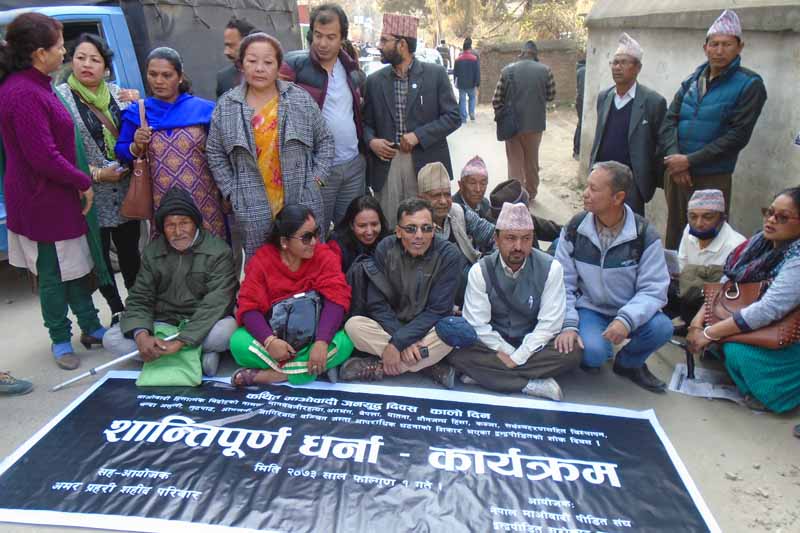Paper on reparative needs of victims unveiled
Kathmandu, May 4
Conflict Victims Common Platform, an umbrella organisation of victims of the 10-year armed conflict that ended in 2006, today unveiled an advocacy paper highlighting reparative needs of conflict victims.
The paper has recommended to concerned local- and central-level authorities and transitional justice commissions to protect, respect and fulfil conflict victims’ right to full and effective reparation.
The paper has categorised victims’ reparative needs under two categories — common and specific.
Under the common reparative needs of victims, the paper has highlighted the need for issuance of identity cards to the victims; short- and long-term financial assistance to ensure food, shelter and clothing; employment provision; free education; reservation in technical education; free health care; psychosocial counselling; vocational and skill oriented trainings; and loan facility.
Other common reparative needs underscored by the paper include reservation in public service; reconstruction of houses and rehabilitation; legal aids; programmes to mitigate threat and fear; public apology by state and heads of political parties; construction of memorials; marking a national day; reservation in politics; reservation in share issuance of hydropower companies; easy access to reparation; special provision for victims with specific needs like women, orphans, senior citizens; collective reparation project; and broadening the definition of conflict victims.
Under the specific needs, the report has further categorised victims under eight categories— deceased; enforced disappeared; tortured, kidnapped and detention victims; injured or those living with disabilities; those who suffered rape and sexual violence; former child soldiers; those who faced property-related violations and displacement; and job displacement or loss of employment.
“Some categories of conflict victims have particular and specific reparative needs in addition to common reparative needs,” read the paper. As per the report, specific reparative needs for the family members of the deceased are education, employment, and livelihood support, as majority of the families of those killed during the conflict have been facing financial troubles because of the absence of the head of the family or breadwinner.
As far as the enforced disappeared are concerned, the report says the most important need of the families is the ‘need to know the fate and whereabouts of loved ones’ as they have not been able to perform last rites and not able to enjoy and establish their rights on immovable property.
For those facing rape and sexual violence, the report identified creation of a conducive environment to receive medical treatment along with maintaining confidentiality as their utmost need. It also emphasised on needs to end social discrimination and stigma, and to restore dignity and respect of the victims.
The report has also made some recommendations to the government, authorities concerned, and the two transitional justice mechanisms — the Commission of Investigation on Enforced Disappeared Persons and the Truth and Reconciliation Commission.
The recommendations include, among others, taking immediate steps to ensure most urgent needs of victims; designing, implementing and monitoring reparation program; formulating and amending necessary laws as per international standards and the Supreme Court’s decisions; allocating budgets for reparation programmes; complementing reparation programmes with other pillars of transitional justice — truth-telling, investigations, and prosecutions and institutional reform; and ratifying key international laws an treaties.
Addressing the launch event, Minister for Law, Justice and Parliamentary Affairs Sher Bahadur Tamang said the government was not for distributing ‘flat reparation’ for all but on the basis of the nature of the cases of human rights violations.
He said the government would not only focus on distribution of compensation, but also on other aspects of reparations such as reconciliation. “Compensation only cures the wounds superficially, but reconciliation measures are the ones that cure the wounds completely,” he said.
Making a presentation during the event, CVCP Chairman Suman Adhikari said the paper was prepared following consultations with victims from across the country. He underscored the need for the state to acknowledge that reparation was not merely a service, but the rights of the victims.






